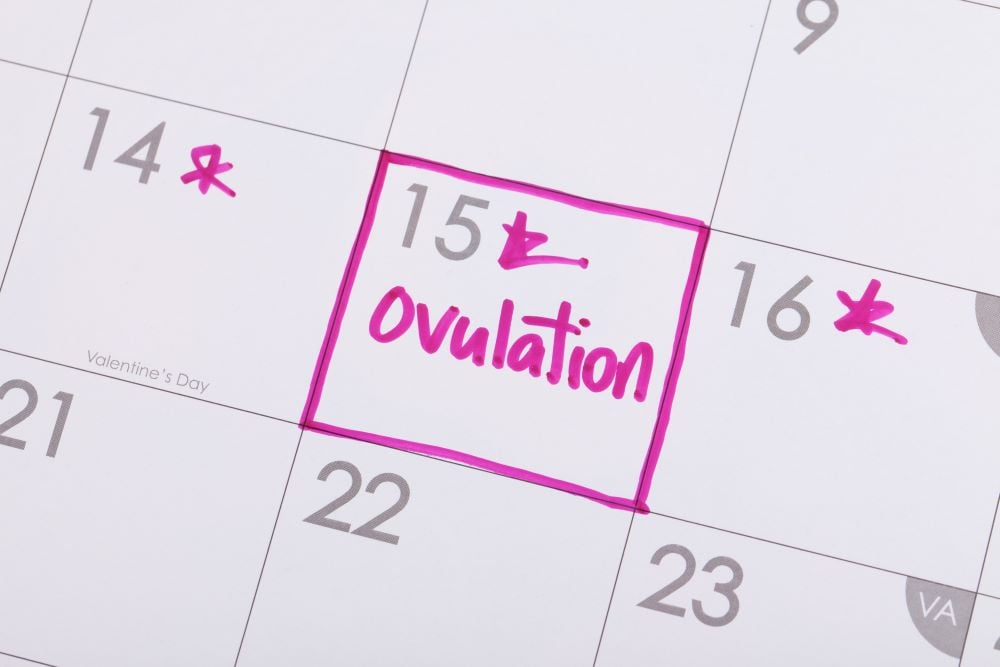Experiencing menstrual periods without ovulating, known as anovulatory cycles, can be a confusing and concerning situation for women trying to conceive or simply looking to understand their reproductive health. Learning more about ovulation and anovulation can help you gain insights into your menstrual and ovulation patterns and take the necessary steps to address any concerns. Below, we explore the importance of ovulation and why anovulation might occur.
Why is Ovulation Important?
Ovulation is when an ovary releases a mature egg, making it available for fertilization by sperm. This process is crucial for natural conception, as it allows for the possibility of pregnancy each month.
Regular ovulation also indicates a healthy reproductive system and overall good hormonal health. Without ovulation, much of the body’s progesterone isn’t produced, which may lead to various issues due to hormonal imbalances. (It’s not just about getting pregnant!)
What Causes Ovulation To Occur?
Ovulation is regulated by a complex interplay of hormones, including the follicle-stimulating hormone (FSH), luteinizing hormone (LH), estrogen, and progesterone. These hormones work together to ensure an egg’s proper maturation and release each month. The process of ovulation includes the follicular phase, LH surge, and luteal phase. So, let’s take a closer look at what happens beneath the surface.
During the follicular phase, FSH stimulates the growth of several follicles in the ovary, each containing an immature egg. As the follicles grow, they produce estrogen, which causes the uterine lining to thicken in preparation for a potential pregnancy. When one follicle becomes dominant and reaches maturity, a surge of LH triggers the ovary to release the mature egg, marking the beginning of ovulation.
After ovulation, the remaining follicle transforms into the corpus luteum, which secretes progesterone to maintain the uterine lining and support pregnancy (amongst other functions). If fertilization does not occur, the corpus luteum disintegrates, causing progesterone levels to drop and menstruation to begin.
How Do You Know If You’re Ovulating?
There are several methods to determine if you are ovulating, including:
- Tracking your menstrual cycle: You can estimate when ovulation may occur by keeping a record of your menstrual cycle and noting your monthly patterns. Ovulation typically happens around the middle of the menstrual cycle, about 14 days before the start of the next period.
- Monitoring basal body temperature (BBT): Your BBT is your body’s temperature at rest. It slightly increases after ovulation due to the release of progesterone. By tracking your BBT daily using a basal thermometer, you can identify the subtle temperature shift that indicates ovulation has occurred.
- Ovulation predictor kits (OPKs): OPKs detect the presence of LH in your urine, which surges 24-48 hours before ovulation. Using these kits can help you predict when ovulation is about to occur.
- Tracking cervical mucus: As estrogen levels rise during the follicular phase, cervical mucus becomes more abundant and changes in texture, ultimately taking on a clear, slippery, and stretchy consistency (similar to raw egg whites) during ovulation. Monitoring these changes can help you identify when you are most fertile.
- Pelvic ultrasound: A pelvic ultrasound performed by a healthcare professional can visualize the development of follicles and confirm if ovulation has occurred.
If Ovulation Tests Negative, Can I Still Get Pregnant?
Ovulation predictor kits (OPKs) detect the presence of the luteinizing hormone (LH) in your urine, which surges 24-48 hours before ovulation. However, there are instances when OPKs may yield a false negative result, indicating that you are not ovulating even if you are. Some potential reasons for false negatives include the time you’ve taken the test, your cycle, and frequency.
LH levels are usually highest in the early afternoon, and testing in the morning or late evening may produce a false negative result. If your menstrual cycles are irregular, this can further create challenges when determining if ovulation has occurred, leading to false negatives.
Testing only once a day or every other day may also cause you to miss the LH surge, resulting in a false negative. If you receive a negative ovulation test but suspect that you may be ovulating, it’s still possible to get pregnant. Tracking other fertility signs, such as basal body temperature and cervical mucus, can help you confirm ovulation and identify your fertile window.
What is Anovulation?
Anovulation is when a woman’s ovaries do not release an egg during her menstrual cycle. This means that ovulation does not occur, even though a woman may still experience regular periods. Anovulatory cycles can cause infertility, as the absence of ovulation prevents the possibility of conception.
What Causes Anovulation?
There are several potential causes of anovulation, including:
- Hormonal imbalances: Imbalances in estrogen, progesterone, follicle-stimulating hormone (FSH), and luteinizing hormone (LH) can interfere with a regular menstrual cycle and disrupt the ovulation process.
- Polycystic ovary syndrome (PCOS): PCOS is a common hormonal disorder characterized by high levels of androgens (male hormones), irregular periods, and small cysts on the ovaries. Women with PCOS often experience anovulation.
- Thyroid disorders: Both hypothyroidism (underactive thyroid) and hyperthyroidism (overactive thyroid) can interfere with ovulation due to their effects on hormone regulation.
- Excessive physical or emotional stress: High-stress levels can further disrupt the hormonal balance required for ovulation.
- Being underweight or overweight: Extremes in body weight can affect hormone production, particularly stress levels, and hinder ovulation.
- Premature ovarian failure (POF): POF occurs when a woman’s ovaries stop functioning before the age of 40, leading to anovulation and infertility.
- Certain medications: Some medications, such as hormonal contraceptives and chemotherapy drugs, can temporarily or permanently impact ovulation.
If you suspect you are experiencing anovulatory cycles, it is crucial to consult a healthcare professional who can assess your condition, identify the underlying cause, and recommend appropriate treatment options.
What Are the Symptoms of Anovulation?
The symptoms of anovulation can vary from woman to woman and may be subtle or even be absent in some cases. However, common signs and symptoms of anovulation include irregular menstrual cycle, heavy bleeding, spotting, absence of a premenstrual cycle, and fertility struggles.
Anovulatory cycles often lead to irregular or absent periods as the hormonal changes that trigger ovulation are disrupted. Without ovulation, the endometrium (the lining of the uterus) may become thicker, leading to heavier or longer periods. Anovulatory cycles can also cause hormonal imbalances that result in intermittent spotting or bleeding between periods.
Women who are not ovulating are further unlikely to experience typical premenstrual symptoms, such as breast tenderness, bloating, or mood changes.
Lastly, anovulation is a common cause of infertility, as the absence of ovulation prevents the possibility of conception.
Anovulatory Bleeding vs Period
Anovulatory bleeding, also known as breakthrough bleeding, occurs when the endometrium is shed without the occurrence of ovulation. It can be challenging to differentiate anovulatory bleeding from a regular period.
Anovulatory bleeding can be irregular and unpredictable, while regular periods follow a more consistent cycle. Anovulatory bleeding may be lighter or heavier than regular periods and can last longer or shorter.
Women experiencing anovulatory bleeding are also unlikely to exhibit typical signs of ovulation, such as changes in cervical mucus or a mid-cycle temperature rise. If you suspect you are experiencing anovulatory bleeding, it is important to consult a healthcare professional for further evaluation and guidance. This can help you not only conceive easier in the future, but also support your overall health.
Anovulatory Cycle Treatment
The treatment for anovulatory cycles depends on the underlying cause and the individual’s reproductive goals. Potentially unsurprisingly, maintaining a healthy weight, managing stress, and adopting a balanced diet and regular exercise routine can help regulate hormones and promote ovulation.
Oral medications such as clomiphene citrate (Clomid) or letrozole (Femara) can further stimulate ovulation by encouraging the release of FSH and LH. For women with polycystic ovary syndrome (PCOS), the medication metformin can help regulate insulin levels, promoting regular ovulation. Alternatively, injected hormones like FSH and LH can stimulate ovulation in cases where oral medications are ineffective.
For women who do not respond to other treatments or have additional fertility concerns, you may want to consider assisted reproductive technology (ART) options like in vitro fertilization (IVF). Working closely with a healthcare professional to determine the most appropriate treatment plan based on your specific needs and reproductive goals is crucial to find a solution that is right for you.
By being aware of the factors involved in anovulation, you can take the necessary steps to address any concerns and seek appropriate medical guidance. While experiencing periods without ovulation can be a frustrating and confusing situation, you don’t have to navigate this complex fertility issue alone. ELITE IVF is here for you. Contact us today for more information, and to begin your fertility journey.


